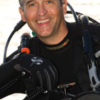Brian Skerry

Brian Skerry
Brian Skerry is an underwater photojournalist who works primarily for National Geographic magazine...
NationalityAmerican
ProfessionPhotographer
CountryUnited States of America
clean creating empty found national plants seem substance though
Under the snowcapped mountains of Fiordland National Park, freshwater streams empty into the saltwater fiords, creating a unique ecosystem. This is a heavily wooded park, so the water in the streams is stained with tannin, a substance found in plants that makes clean water seem dirty, though it isn't.
support mind needs
The Internet and my web site have grown to become essential components of my business. The expertise and support that LuxSci continually delivers is crucial to maintaining the worldwide contact I need to succeed. LuxSci provides peace of mind!
ocean thinking sharks
There's still a lot of people out there who think the only good shark is a dead shark.
ocean years lasts
Last year the [harp seal] pup mortality rate was 100 percent in parts of the Gulf of St. Lawrence.
photography powerful believe
The oceans are in trouble. There are some serious problems out there that I believe are not clear to many people. My hope is to continually find new ways of creating images and stories that both celebrate the sea yet also highlight environmental problems. Photography can be a powerful instrument for change.
along considered dangerous episodes famous great history sea sharks tip white
The Oceanic White Tip is considered one of the most dangerous sharks in the sea along with the Great White and Tiger. It is responsible for some of the most famous episodes of man-eating in history, such as when the U.S.S. Indianapolis sank in 1945.
deeper developed feed peer raise waters yearn
I have photographed sharks in waters around the globe, and I always want more and yearn to peer deeper into their world. To feed my passion and to raise awareness, I developed a story about sharks for 'National Geographic' magazine.
age attended became couple dive finally held oldest scuba year
I finally became a scuba diver at age 15 or so, and a couple of years after that, I attended a dive show that is held every year in Boston. It's the oldest one in the world and it's still going on - it's called the Sea Rovers.
cover hard pacific places refer soft western
For where Kingman is located, the coral cover is unique in the world. I refer to it as a universe of hard corals. You are not going to find soft corals like in the western Pacific - places like Indonesia, Palau, or Fiji.
amazing best diving encounters honestly islands whales
I've been diving for about 30 years, and I can honestly say that I've had some amazing encounters with sharks, squids, and other whales. But the encounter with the right whales in the Auckland Islands was probably the best thing I've ever done. It was just that amazing.
blue coast elegant group late marine miles moved next shark stunning
I swam with my first shark in the 1980s. I was 20 miles off the coast of Rhode Island, working with a group of marine scientists. Late in the day, a 5-foot long blue shark swam into our chum slick. For the next hour, I marveled at the animal's stunning indigo color and the elegant way she moved effortlessly through the sea.
change instrument stories
Photography can be a powerful instrument for change, and photojournalists can tell stories that make a difference.
almost blue photos whale whales
Most whale photos you see show whales in this beautiful blue water - it's almost like space.
breathe health majority mention oxygen since survival
Since the majority of the oxygen we breathe comes from the ocean, not to mention much of the world's protein, it is not an exaggeration to say that when our oceans' health declines, our very survival is at risk.